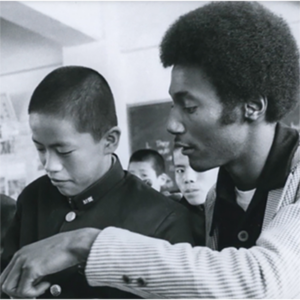 Highlights and recordings from a week of celebration and wide-ranging discussion about the future of Peace Corps. And a review of some of the stories you don’t want to miss.
Highlights and recordings from a week of celebration and wide-ranging discussion about the future of Peace Corps. And a review of some of the stories you don’t want to miss.
Edited and Produced by Jake Arce and Orrin Luc
On March 1, 1961, President John F. Kennedy signed executive order 10924, establishing the Peace Corps with the hopes of promoting world peace and friendship. Peace Corps Week is a time for us as a community to commemorate and recognize all of the ways that Peace Corps has made an impact — in individual lives and in communities around the world.
This year we mark six decades. But this is also an unprecedented time for the Peace Corps. In March 2020, all Volunteers serving around the world were evacuated because of the COVID-19 pandemic. In a community-driven effort, National Peace Corps Association is working to help transform Peace Corps: to reimagine, reshape, and retool the agency for a changed world. So while we celebrate this historic milestone, we also focus on the work that must be done in the present to make a better and stronger Peace Corps for the future.
Here are highlights of events held to celebrate Peace Corps Week 2021. Included here are events for which we have recordings and links. Listings will be updated as more events become available.
Scroll down for a look at some news stories, opinion pieces, and slide shows that were published during Peace Corps Week.
Be sure to sign up for our newsletter (at the bottom of our homepage) and to follow us on social media for the latest. And, of course, be sure to join NPCA (the basic level is free!) to receive WorldView magazine and explore stories in greater depth.
EVENTS
Monday, March 1
RPCV Rep. John Garamendi introduces Comprehensive Peace Corps Legislation

On March 1st 2021, RPCV Representatives Garret Graves (R-LA) and John Garamendi (D-CA) introduced the Peace Corps Reauthorization Act (H.R. 1456) in the House of Representatives. We invite readers to view Congressman Garamendi’s press release, where readers can find a link to the legislation and the many provisions to improve and honor the work of Peace Corps Community.
The key points of The Peace Corps Reauthorization Act of 2021 include:
- Authorizes $600 million in annual funding by fiscal year 2025 for the Peace Corps to support the goal of deploying 10,0000 volunteers worldwide, once safe and prudent to do so following the subsidence of the COVID-19 pandemic. This is an increase over the flat $410 million funding level provided by Congress in recent years.
- Expedites re-enrollment of volunteers whose service ended involuntarily due to the COVID-19 pandemic and allows volunteers to resume in-country service, once safe and prudent to do so.
- Directs the Peace Corps to provide benefits (readjustment allowance, health insurance, noncompetitive eligibility status for federal hiring) to Volunteers whose service ended involuntarily due to the COVID-19 pandemic.
- Guarantees three months of health insurance coverage for returned Volunteers paid by the Peace Corps, with the option to renew for additional three months at individual expense. Currently, the Peace Corps only offers automatic enrollment for 2 months of paid health insurance coverage, with the option to renew for another month at individual expense.
- Requires the Peace Corps to outline various public and private health insurance coverage options to returned Volunteers, including for returned volunteers under the age of 25 with coverage on their parent’s health insurance under the Affordable Care Act.
- Includes the Menstrual Equity in the Peace Corps Act sponsored by Rep. Grace Meng (D-NY) since 2020.
- Extends whistleblower and anti-retaliatory protections that currently apply to Peace Corps contractors to Peace Corps volunteers, including protections against reprisals by any Peace Corps employee, volunteer supervisor, or outside contractor.
- Includes the Respect for Peace Corps Volunteers Act sponsored by Rep. Albio Sires (D-NJ) since 2013.
- Extends Peace Corps Volunteers’ 12-month hiring preference for most federal job openings during any federal hiring freeze, government shutdown, public health emergency (such as COVID-19 pandemic), or while a Volunteer receives federal worker’s compensation benefits for any injury during their Peace Corps service.
- Directs the Peace Corps and U.S. State Department’s Bureau of Diplomatic Security to update plans and protocols for Peace Corps Colunteer security support and protection in foreign countries.
- Increases the federal workers’ compensation rate for all Peace Corps volunteers injured or disabled during their service from a GS-7 to a GS-11 level, the same rate provided for Peace Corps volunteers with dependent children under current law.
Read our Peace Corps Reauthorization Act issue brief and talking points. There is no companion legislation in the Senate at the present moment.
Celebrating 60 Years of Service and Friendship – A Conversation with Peace Corps Directors
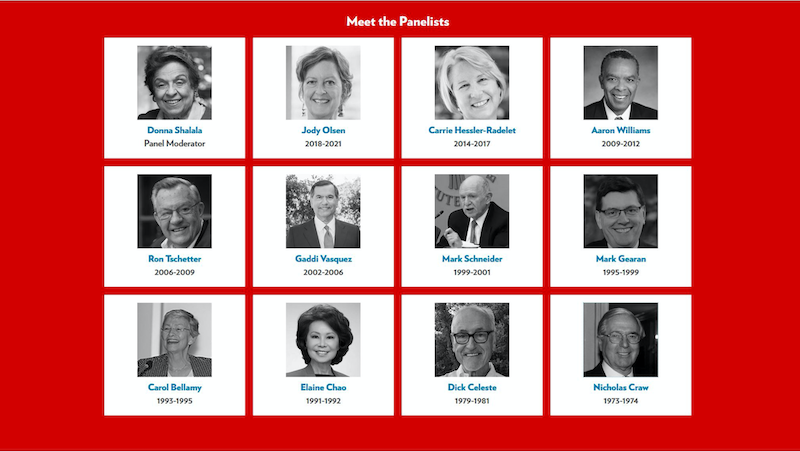
Peace Corps at University Wisconsin-Madison hosted former Peace Corps Directors for a broad-ranging discussion and personal insights into their time directing the agency. The former directors also provided their advice on the Peace Corps going forth, along with recommendations for the Biden Administration. The conversation was moderated by RPCV Donna Shalala.
Many directors highlighted that the pandemic had actually increased the need for Volunteers — and now is the time to make a difference. Former Director Mark Gearan (1995–99) put it so: “We’re at a point now in our nation’s history and country where the importance of service, national and community service, could not be more important.”
View a recording of the conversation here.
Former Directors: “If I had three minutes to talk to President Biden about the Peace Corps…”
Nick Craw: “My first request would be to double the size of the program.”
Richard Celeste: “Double it!”
Gaddi Vasquez: “Grow and expand the Peace Corps.”
Aaron Williams: “Now is the time.”
More takeaways:
Donna Shalala | Former Representative of Florida in U.S. Congress, Former Secretary of Health and Human Services (RPCV Iran 1962–64)
“The Peace Corps has always been bipartisan. It has always had the support of both parties. Some of the most significant budget increases were during Republican presidency, so that has been very important for the Peace Corps.”
Jody Olsen | Peace Corps Director 2018–21
“Our 60 years, our 245,000 returned Peace Corps Volunteers, is what has kept us strong this last year, and is what is going to get us back as soon as possible.”
Carol Bellamy | Peace Corps Director 1993–95
“What was always the same were the Volunteers: They were flexible, the ingenuity was incredible, and they figured out how to make things work.”
Elaine Chao | Peace Corps Director 1991–92
“We talked to the former communist heads of all these countries, and they all knew about Peace Corps, and they all wanted us to be there. And it was just amazing to them that Americans, young Americans, would be willing to go to their country, work basically for nothing for two years, and help people that they’ve never met. That was something so moving to them.”
Aaron Williams | Peace Corps Director 2009–12
“It’s a privilege to serve as Peace Corps Director. It’s a sacred privilege, too, because we’re entrusted with this iconic American institution that Sargent Shriver created. And one that provides young Americans a chance to serve around the world and promote world peace and friendship — and to present the full scope of American diversity.”
Ron Tschetter | Peace Corps Director 2006–09
“I went over to swear in the first group and we had a wonderful exchange of thoughts and ideas and then we went to the swearing in part of it and I raised my hand and started the process and as I looked out over the group of Volunteers, there were three or four of them who were in tears because of the emotion of what was happening… I think it told me what it really means to the Volunteers.”
Gaddi Vasquez (Peace Corps Director from 2002-2006):
“Opening Mexico was one of the great memories of my time as director of the Peace Corps because it is a country that has great opportunities for Peace Corps Volunteers and I think thus far has proven to be a very robust program.”
Richard Celeste | Peace Corps Director 2002–06
“I think that the changes here in this country and around the world as a consequence of the pandemic are going to be a challenge and an opportunity for us.”
Mark Schneider (Peace Corps Director from 1999-2001):
“The Volunteers that I’ve come in contact with over the years across the globe really continue that tradition of service and commitment to their country, to their family, and to their community and trying to convey something that will help others.”
Carrie Hessler-Radelet (Peace Corps Director from 2014-2017):
“Peace Corps is really aware now, it has made more policy changes. It’s trained every single volunteer and staff person. It’s built an office of advocacy. Specialized training and training in trauma and informed care for first responders, an anonymous hotline hosted by a similar organization, and a Sexual Assault Advisory Council.”
Mark Gearan (Peace Corps Director from 1995-1999):
“We’re at a point now in our nation’s history and country where the importance of service, national and community service, could not be more important. It’s what unites us, and Volunteers would say that it crosses the boundaries of difference. We know the needs exist both domestically and globally for service. So as we celebrate this 60th anniversary of the Peace Corps, which is well placed — the 70th anniversary of the Peace Corps, and the 70th anniversary of President Kennedy’s call to service, can really be a major accomplishment in the next ten years to enhance the threads of service.”
Tuesday, March 2
Women of Peace Corps Legacy | Former Women Peace Corps Directors: A Conversation

Withdrawing volunteers was “the most difficult decision I made in my life.”
—Jody Olsen, Peace Corps Director 2018–21
The Women of Peace Corps Legacy hosted four women who have served as Peace Corps Director for a conversation on their experiences as directors and Volunteers, tackling the challenges of administering the agency to, as Carrie Hessler-Radelet recounted, being a victim of sexual assault. Jody Olsen discussed how the pandemic led to the unprecedented decision in 2020 to evacuate all Volunteers — and the tremendous organizational efforts that took around the world. “We weren’t aware of what was happening country by country,” Olsen said. “Suddenly, what was a gentle wave was becoming a big wave and a big tsunami.”
Wednesday, March 3
Museum of the Peace Corps Experience and Katzen Arts Center at American University
Exhibit Opening – “Peace Corps at 60: Inside the Volunteer Experience”

It’s about stories connecting people and communities. “Peace Corps at 60: Inside the Volunteer Experience” is curated by Jack Rasmussen, Director of American University Museum; Aly Schuman, Alper Initiative for Washington Art Fellow; and RPCV Patricia A. Wand, Co-Chair of Museum of the Peace Corps Experience. The virtual exhibition showcases objects and stories from more than 30 Volunteers.
Thursday, March 4
Smithsonian Folklife Festival | The Peace Corps at 60 and Beyond: “A Towering Task” Screening & Discussion
“Rebuilding world peace and friendship, one relationship at a time.”
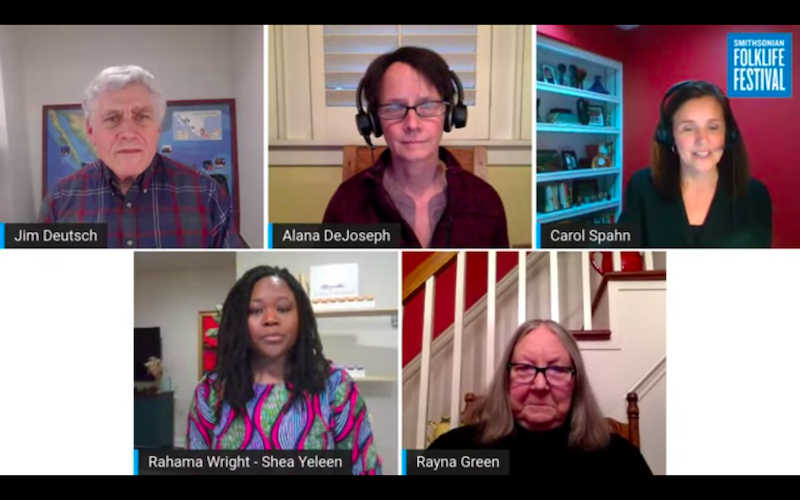
This pivotal moment allows us to look back on 60 years of Peace Corps promoting world peace and friendship, while also looking forward to the next chapter of Peace Corps history. The Smithsonian Folklife Festival began in 1967, not long after the Peace Corps, with many similar goals — especially to promote a greater understanding and appreciation of world cultures. In 2011, the Folklife Festival commemorated the agency’s 50th anniversary with a program that featured Peace Corps volunteers and their partners from 16 countries.
In 2021, the Festival once more explores the agency’s significance and impact by hosting a discussion with: Acting Peace Corps Director Carol Spahn; Director of “A Towering Task” Alana DeJoseph; and RPCVs Rayna Green and Rahama Wright. All discussed their time in the Peace Corps, along with recommendations for improvement going forward — especially in the wake of the COVID pandemic, and deeply felt need to foster diversity.
Takeaways:
Carol Spahn: Host countries are hoping to have Volunteers back soon. The need to continue sending Peace Corps Volunteers out to the host communities in the future will help to further her goal of “rebuilding world peace and friendship, one relationship at a time.”
Rahama Wright: The experience of Volunteering drives home for communities and Volunteers alike that they “share a common humanity.” Wright also brought up some of her current initiatives in Northern Ghana, in relation to SheaYeleen butter products and production in 14 different villages.
Peace Corps Agency | 60 Years of Service: RPCVs’ Impact on the Fields of Philanthropy and Corporate Social Responsibility

From Peace Corps to work in global philanthropy and social causes: panelists brought to bear their experience and expertise over the past several decades, tackling social issues through nonprofit work, social initiatives, and partnering with the private sector. On hand for the event, from left: Stephany Guachamin Coyago, Manager, Leadership Advancement Programs, Hispanic Association on Corporate Responsibility (RPCV/Peru); Harris Bostic, Senior Advisor, Tides (RPCV/Guinea); and Bruce McNamer, President, The Builders Initiative (RPCV/Paraguay).
Second Gentleman Douglas Emhoff opened up the discussion by praising the work of the Peace Corps around the world, and he addressed how Volunteers have made an impact abroad over the past 60 years.
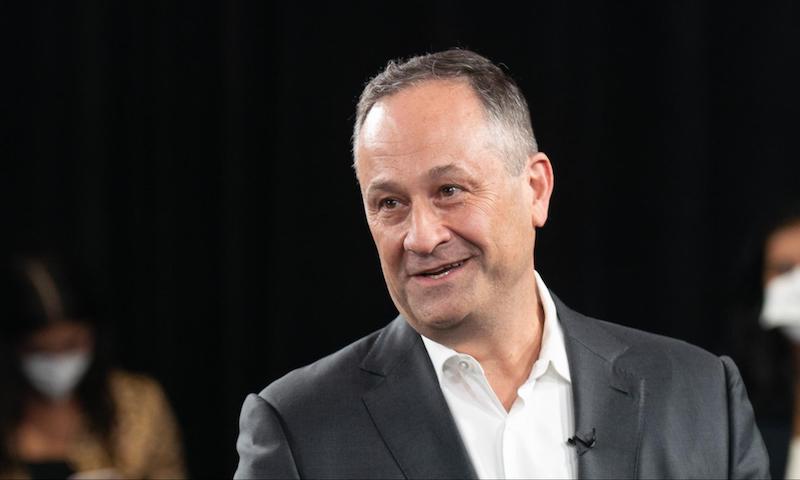
“Peace Corps Volunteers are moving mountains and tackling some of the most pressing global issues on a grassroots level.”
— Douglas Emhoff
Emhoff also discussed the importance of the Peace Corps in representing the values and diversity of the United States. “Peace Corps volunteers are moving mountains and tackling some of the most pressing global issues on a grassroots level,” he said. He also stated that the commitment of Volunteers show by serving — and promoting service — has offered inspiration to many Americans.
Saturday, March 6
Sacramento Valley RPCVs | Peace Corps 60th Anniversary with Representative John Garamendi
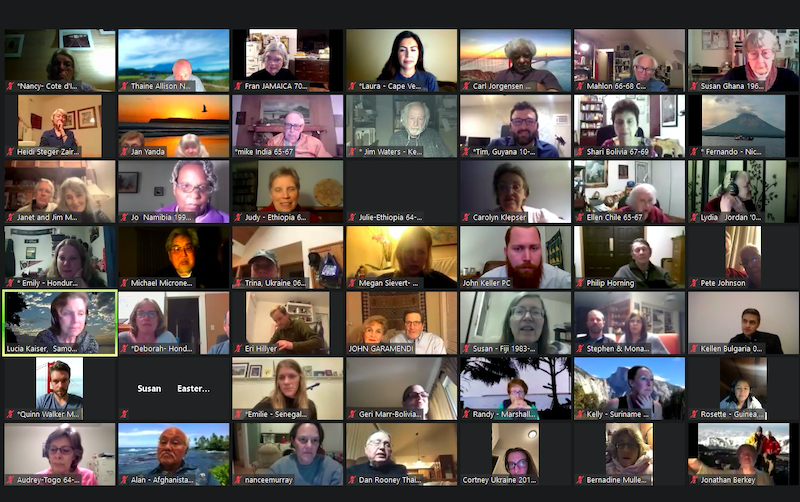
RPCV Congressman John Garamendi (D-CA) and his wife and fellow RPCV Patti Garamendi took part in a conversation with Peace Corps recruiter John Keller for Sacramento Valley . RPCVs in California. The Garamendis served with the Peace Corps in Ethiopia. On March 1 of this year, John Garamendi introduced the Peace Corps Reauthorization Act of 2021, which includes authorizing $600 million in annual funding by fiscal year 2025 for the Peace Corps and expediting re-enrollment of volunteers whose service ended involuntarily due to the COVID-19.
Read our Peace Corps Reauthorization Act issue brief and talking points. There is no companion legislation in the Senate, at the present moment.
Watch the conversation with Congressman John and Patricia Garamendi here.
Peace Corps Week Encore — Tuesday, March 9
The 60th Anniversary of the Peace Corps: The History of the Program and What Lies Ahead
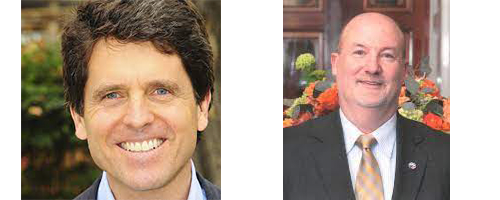
In President Kennedy’s first days in office, he asked Sargent Shriver to create the Peace Corps, which over the last 60 years has sent over 250,000 Americans to more than 140 countries to serve as global citizens. Mark Shriver, President of the Save the Children Action Network (left), and Glenn Blumhorst, President of National Peace Corps Association, took part in a conversation at Kennedy’s campaign promise and forward to what lies ahead for the Peace Corps. The event was hosted by Returned Peace Corps Volunteer Elizabeth J. Wilson, the inaugural director of the Arthur L. Irving Institute for Energy and Society and Professor in the Environmental Studies Department at Dartmouth. It was sponsored by the Dartmouth Center for Social Impact, the Dickey Center, and the Rockefeller Center.
“The Peace Corps seeks peace through service, not through economic strength nor military power,” Shriver said, quoting a speech delivered by his father, Sargent Shriver, who served as first Director of the Peace Corps. And, as Blumhorst noted, “the cause of building peace is far from finished.”
Dive into Darmouth’s history with Peace Corps — and connections around the globe.
Watch the event here: The 60th Anniversary of the Peace Corps – The History of the Program and What Lies Ahead | Nelson A. Rockefeller Center for Public Policy, Dartmouth College
PEACE CORPS WEEK IN THE NEWS: STORIES, OPINION PIECES, SLIDE SHOWS
The Peace Corps remains “one of America’s greatest achievements, appealing to our highest instincts.”
— Maureen Orth, special correspondent for Vanity Fair, Colombia RPCV, and founder of the Marina Orth Foundation
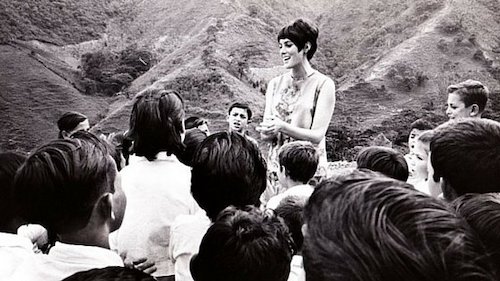
Maureen Orth, Former Congressman Joseph P. Kennedy III, and NPCA President Glenn Blumhorst are featured in American Way magazine in a special feature on Peace Corps’ 60th Anniversary. The profile chronicles the work of these three Volunteers as examples of leadership and inspiration..
The Chicago Tribune: “Abolishing the Peace Corps would be a mistake”
Chicago Tribune editorial board member and Returned Corps Volunteer Lara Weber answers the question posed for her years ago: “Why should you, a white woman, go work in Africa?” For her personally, it began with: “I liked the Peace Corps’ grassroots approach to development work – that we would be working as partners with local community members, not as ‘experts’ or advisers.”
She makes the case for why Peace Corps can and should continue to make an impact. Read her piece in the Chicago Tribune and a response from NPCA here.
Listen Up: Colorado Public Radio talks to evacuated Volunteers — and takes a deep dive into future recommendations for the Peace Corps

“What really personally hurt the most was not being able to say goodbye to the two women I worked with and then my kids,” evacuated Volunteer Hunter Herold tells Colorado Public Radio. Herold and Dylan Evans were Volunteers evacuated from Kosovo in March 2020 as COVID-19 swept the globe. Calvin Brophy was serving as a Volunteer in Ethiopia. They tell their stories to host Ryan Warner. And Alana DeJoseph, director of the documentary “A Towering Task,” takes a deep dive into her service as a Volunteer in Mali in the 1990s and the humbling lessons it offered. She explores making of her Peace Corps documentary, and how we need to reimagine and retool Peace Corps for a changed world — including how the Peace Corps community needs to address systemic racism, financial barriers to serving, health care benefits, and more.
NBC News: The Peace Corps Turns 60
NBC News serves up a feature on where Peace Corps has been — and the challenges the agency faces today. The segment includes Harvard University’s Professor Fredrik Logevall, Senior Advisor to the Director of the Peace Corps Darlene Grant, and Peace Corps Volunteer Ben Whong. It also addresses Peace Corps’ struggles and successes with adjusting to pandemic life.
One Takeaway from Darlene Grant:
“I served as a Peace Corps volunteer after 18 years as a faculty member at the University of Texas. I chose to serve 2009–11 in Cambodia. It changed the trajectory of my career, the Returned Peace Corps Volunteers will tell you what they received from the people in their host country and communities was so much more than what they gave.”
What We Can Do Together: Senator Elizabeth Warren to the Peace Corps Community
“I strongly believe in what we can do together,” says Senator Elizabeth Warren. “Thank you for pouring your heart into your work.” A message of gratitude in honor of 60 years of service by Peace Corps Volunteers around the world — working with communities to build a better future together when it comes to education, health, food security, and so much more.
Thank you for making our state, the nation, and the world a better place: Colorado Governor Jared Polis to Volunteers
“Peace Corps has three goals, and it’s the third goal in particular — to promote the understanding of other peoples on the part of Americans — that I particularly want to celebrate,” says Colorado Governor Jared Polis in a video message of thanks. “Returned Peace Corps Volunteers spend 27 months in their host countries contributing to their development and success. But it’s really what they do after, both here in the U.S. and abroad, that makes the Peace Corps such a transformational program. RPCVs continue to serve, including on the front lines of the pandemic here in Colorado. And their cross-cultural fluency helps us move forward as a Colorado for all.”
“Liberia and Peace Corps have enjoyed a long and mutual friendship which I trust will continue and expand once the pandemic is under control.”
—Ellen Johnson Sirleaf, former president of Liberia

Former President of Liberia Ellen Johnson Sirleaf. Photo by Thierry Gouegnon / Reuters
“My country has benefited greatly from decades of Volunteers,” President Johnson Sirleaf writes. “Many served in our critical education sector teaching math, science and English in schools throughout the country. They also inspired young Liberians on the value of public service and promoted strong relationships with them. As president of Liberia one of my first acts was to invite the PC to return as they had been absent during our long years of conflict. It was a pleasure to meet each new group and I was immensely honored to swear many of them in.”
“Thank you for your love for my country, how much you dedicated to it, and hopefully how much you will in the future.”
—Francisco Santos Calderón, Colombian Ambassador to the United States
Ambassador Santos, who previously served as vice president of Colombia, recorded an anniversary message for Volunteers. “Celebrating 60 years of the Peace Corps in Colombia is something that fills my heart with gratitude, with happiness, with excitement, and with hope,” Santos says. “That is what the Peace Corps is: hope — hope of being better human beings, hope of having a better world, hope of how we can help one another.”
The Seattle Times: “May we live the motto of my beloved Peace Corps in Cameroon: ‘We are together.’”
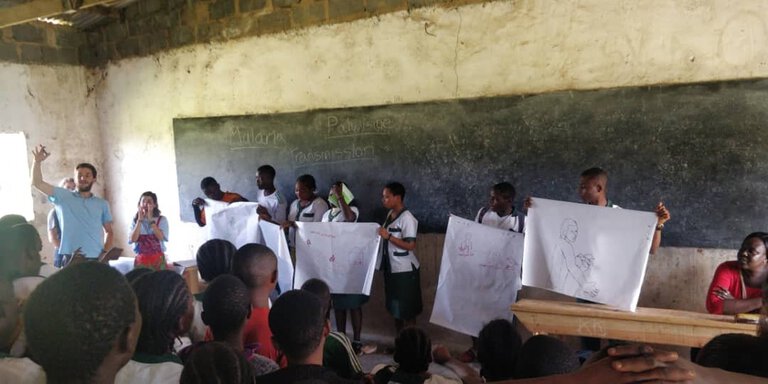
Grant Friedman, left, worked as a health and education Volunteer in Cameroon from September 2019 through March 2020. His time as a Volunteer was cut short abroad due to the pandemic, but he paints an optimistic picture for the future of the Peace Corps and its vital role in fostering meaningful international development. Here’s what he wrote for the Seattle Times.
Washington Post Opinion:

How can the Peace Corps be reimagined and revitalized for the 21st century? “One path forward is looking to our past: a new commitment to and reorientation of the United States Peace Corps that could work with a renewed focus, not as a tool of foreign aid, but as a way for all Americans to engage, listen to and learn from the rest of the world,” writes Lacy Feigh. She served as a Volunteer in Ethiopia and is completed her doctorate in history at University of Pennsylvania. She wrote this compelling this compelling piece for the Washington Post.
Through the Decades: 60 Years of Peace Corps Photos
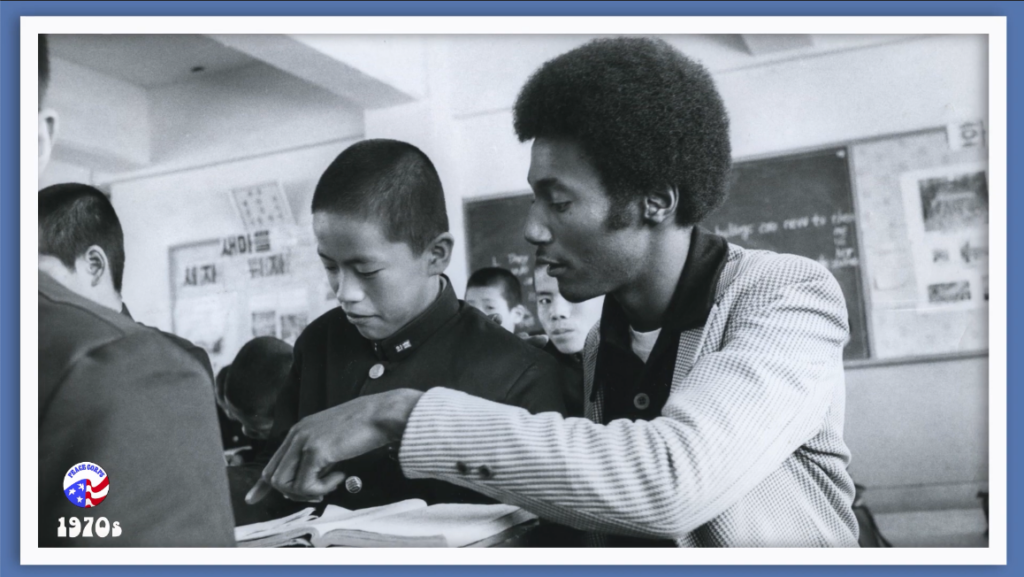
The Peace Corps agency put together this celebratory photo series charting Peace Corps’ evolution through the decades over the past 60 years.
Story updated March 24, 2021 at 10 p.m.
Jake Arce is a graduate student at American University’s School of International Service and is working as an intern with WorldView magazine.
Orrin Luc serves as Digital Content Manager for National Peace Corps Association. He served with the Peace Corps in El Salvador and Mexico.
